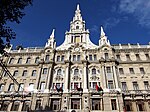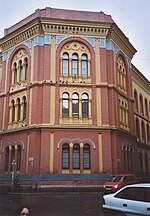Blaha Lujza tér metro station
Commons category link is locally definedEuropean rapid transit stubsHungarian building and structure stubsHungarian railway station stubsHungary transport stubs ... and 2 more
M2 (Budapest Metro) stationsRailway stations opened in 1970

Blaha Lujza tér is a station of the M2 (East-West) line of the Budapest Metro. It is a major transport junction. The station was opened on 2 April 1970 as part of the inaugural section of Line M2, between Deák Ferenc tér and Örs vezér tere.The square is named after Lujza Blaha, an actress (1850–1926). The Hungarian National Theater was located on the square until 1964 when it was demolished (by explosion) because of the subway construction. The 111-year-old New York Café is located at walking distance from it. It was renovated and re-opened in 2006 May by the Italian hotel chain Boscolo Hotels Inc. [1]
Excerpt from the Wikipedia article Blaha Lujza tér metro station (License: CC BY-SA 3.0, Authors, Images).Blaha Lujza tér metro station
Blaha Lujza tér, Budapest Palotanegyed
Geographical coordinates (GPS) Address Nearby Places Show on map
Geographical coordinates (GPS)
| Latitude | Longitude |
|---|---|
| N 47.496666666667 ° | E 19.07 ° |
Address
Corvin Palace
Blaha Lujza tér 1-2
1085 Budapest, Palotanegyed
Hungary
Open on Google Maps










